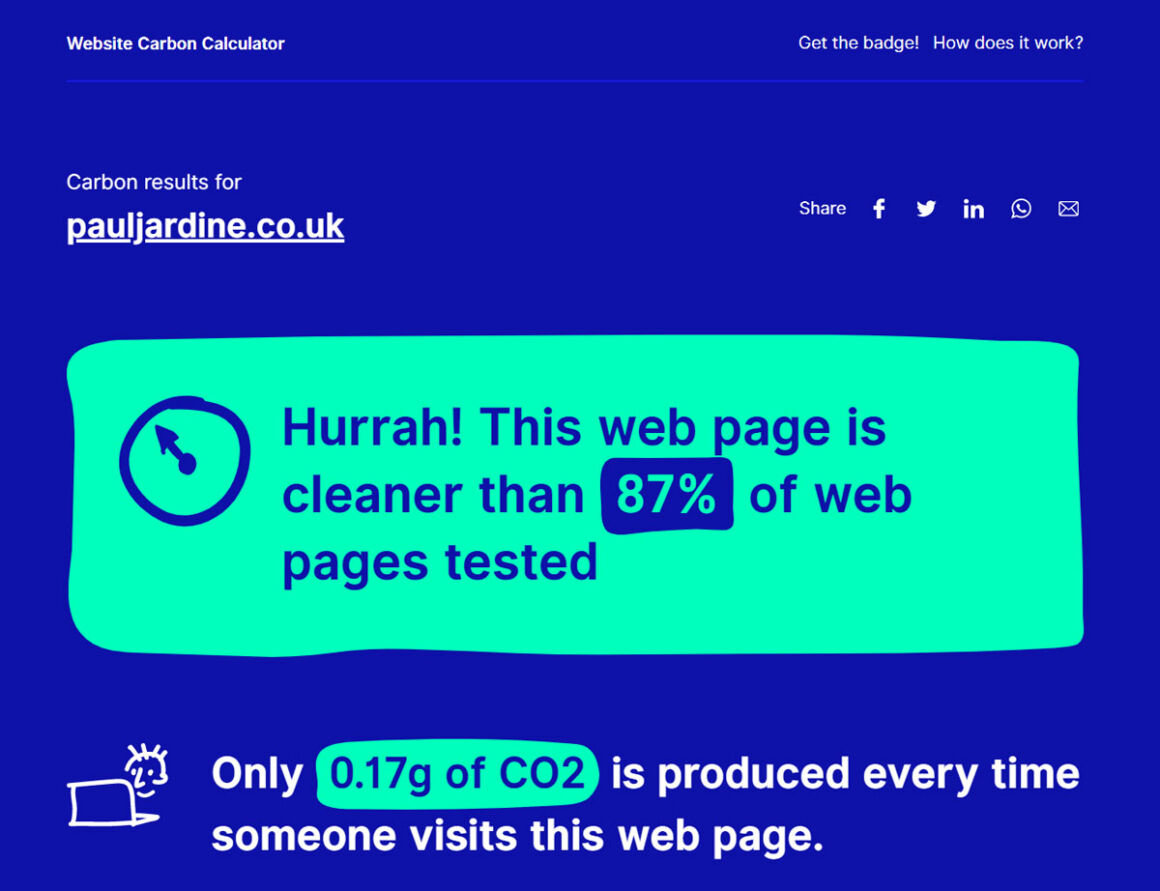Being an environmentally-conscious individual is becoming increasingly mainstream.
Recycling packaging and other materials is at home is relatively straightforward (in the UK anyway, in fact here in Stockport we have 4 different bins!). We are conscious of food waste and food miles, and far from being something that you keep quiet, people are proudly shunning fast fashion for preloved clothes.
Even in businesses, many are choosing to pay a bit extra to reduce their impact on the environment, by switching to greener energy suppliers, choosing recycled and recyclable packaging and addressing issues in supply chains.
However, one thing that is not yet mainstream is an awareness of how our digital activities impact on our carbon footprint.
The environmental impact of your online life
Every digital action you take has an impact on the environment. That’s because everything we do online requires servers and energy; in fact, according to Greenpeace, the IT sector is responsible for consuming around seven per cent of global electricity!
But you don’t need to unplug everything or live like a luddite (unless you want to!). Here are some tips that you can put into practice quite easily to reduce your digital carbon footprint.
Delete your old emails
Don’t just “mark as read”, actually get rid of them. All online files and data are stored on servers, which all need energy to run.
I recently cleared out almost 10 years of old emails and was baffled by the sheer volume of social media notifications, event reminders and adverts, all of which were long obsolete but still taking up server space all this time later.
Make a habit of only keeping messages that you actually need to keep, and deleting those you no longer need on a regular basis.
Unsubscribe
Put the first rule of the waste hierarchy (reduce, reuse, recycle) into action and unsubscribe from emails that no longer serve you.
Typically these might be emails you signed up for to get a discount on your first purchase, but you’re not actually interested in the content you get sent, or notifications from social media.
Who cares that LinkedIn wants you to know someone you met 15 years ago is celebrating a work anniversary? Unsubscribe.
Review your cloud backups
Check over your online storage such as Google Drive, Photo backups, Dropbox and so on. Do you still need the things saved there?
Consider backing up your files to an external hard drive instead to free up the space and energy required to maintain that.
Delete old online accounts

Remember that old Game of Thrones memes Twitter account you used to run? Or the short-lived poutine recipe guide?
They too require energy and (sorry to say) they will probably not be missed by anyone when you delete them.
If you’re not quite ready to let go of your whole Twitter account, I also recently came across a great tool called TweetDelete that bulk deletes old tweets over a certain age.
Get green hosting
Make your website more eco-friendly by using a hosting company that powers its servers from a sustainable source.
You can check if your current web host uses green energy over at the Green Web Foundation.
If hosting feels like an intimidating topic, check out this blog post I did about tips for choosing good website hosting.
Make your website more efficient

A fast-loading site is a greener site. You can make your site perform better by doing the following:
- Compress your images with a tool such as tinyPNG.
- Reduce the number of third-party plugins.
- Ditch tracking scripts.
- Delete unused photos from your site’s media library.
- On WordPress websites, you can also shrink your database size by clearing out old page revisions using the Simple Revisions Delete plugin.
You can test how eco-friendly your website is with the Website Carbon Calculator or learn more the environmental impact of websites in my article How environmentally friendly is your website?
If you would like some help making your website kinder to the environment you can speak to me for website advice!
Video killed the Blue Planet
Introverts, assemble! You can now keep your video off during Zoom calls and say it’s a green move!
A study from Purdue University found an hour’s videoconferencing or streaming uses between 150 grams and a kilogram of carbon dioxide. It also requires between two and 12 litres of water and a land area about the size of an iPad Mini!
Time to go back to old-fashioned phone calls? I have the perfect phone for that…
Small-screen entertainment
Music fans, if you stream certain songs or albums a lot, it’s much better to download them to your device once rather than steam them each time.
And if you watch videos on your phone, regular definition will be fine – you won’t notice miss HD on such a small screen.
Progress over perfection
As always, I like to remind people (myself included!) that while the amount of work we need to do to make the world better can feel overwhelming, as individuals we can only do so much.
As such, it is better to focus on the small steps each of us can take to make things a little bit better, so that collectively our actions can have a bigger impact.
It’s about progress rather than perfection, every time!
